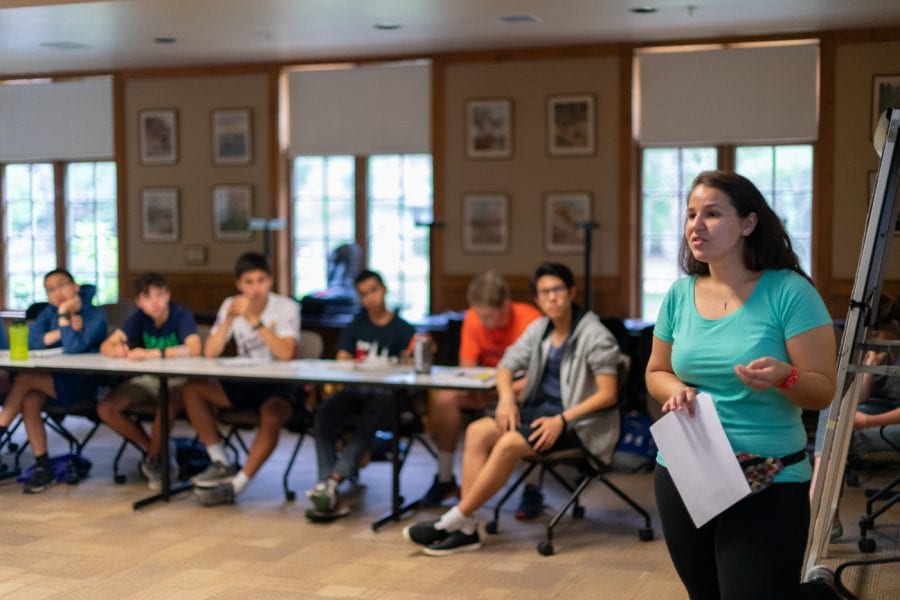Mission
Guiding Principles
Core Values
Leadership Institute Beliefs
Mission
The Leadership Institute’s mission is to help students develop and apply the knowledge, skills and attitudes associated with effective and socially responsible leadership.
Young people are worried about the state of the world and the complex problems facing all inhabitants of the planet. They are motivated to understand these challenges and eager to have a positive impact on their local communities, the nation and the world. We believe that high school students are capable of making a positive difference. Our obligation is to help them understand complex social issues and develop the confidence and competence to make a positive contribution. We must also help them develop the skills and commitment to be reflective about their practice of social responsibility.
The vast majority of leadership development programs in the United States focus on teaching students the essential skills of leadership, e.g. public speaking, debate, interpersonal skills, problem solving, leadership style, conflict resolution, budgeting and fundraising. This Institute teaches some of these but always in the context of, and in relation to, a set of social issues that are of interest to the student. The themes of our courses have included: environmental justice, conflict, health, global issues, human rights, women and leadership, social entrepreneurship, community organizing, science, creativity, and social media. Our goal is to help students understand these complex issues in the context of the Social Change Model of Leadership. The program includes three highly related components: the classroom experience, the residential program, and the Action Plan. Students spend part of their time exploring the history, policy questions, and current complexities of a social issue and part of their time learning and practicing leadership skills. By the end of their course, all students are required to construct an Action Plan, a proposal for how they will apply what they learned in their home communities. Socially responsible leadership requires us to ask the questions: What do we do with who we are and what we know? What we can do that serves the greater good?
After the summer program, we encourage students to communicate with their instructors and the staff regarding their work. In the following summer, all students are invited to submit a final report. Those who demonstrate significant progress are recognized with the Leadership Institute’s Certificate for Social Action.
Guiding Principles
The Leadership Institute believes that students learn best…
- when they are challenged in the context of a supportive community of learners
- when they assume responsibility for their learning and for making contributions to the community of learners
- when their learning has real consequences and can be applied in service to others
- when they are engaged in an experiential and interdisciplinary approach to learning
- when they are engaged in a earning process that includes both action and reflection
- when they can apply their learning to multiple environments
Core Values
- Excellence
- Diversity and Inclusion
- Challenge
- Compassion
- Responsibility
- Scholarship
- Community
- Self-Reflection
- Service
Leadership Institute Beliefs
- Leadership skills can be identified, taught, and learned.
- The traditional definitions of effective leadership are limiting and inaccurate. A wide variety of leadership styles help groups, organizations, and societies identify needs and achieve goals.
- Students should be encouraged to identify their strengths, build on them and take corrective action to deal with their limitations or challenges.
- Leadership is not just about positions of power. Among many other things, it is a process of influence. All students have the capacity to influence others in their schools and communities. While stating this, it is also important to recognize that power differentials exist based on gender, race and ethnicity, social and economic class, religion, sexual orientation, age, organizational structure, economic power, and many other variables.
- Our courses are designed to help students develop the competencies and confidence to have a positive impact on their community.
- Young people care about the state of the world. Through education, skill building and collaboration with other students and elders, they can be inspired and motivated to take action regarding social issues that demand our attention.
- It is often said that young people are “our future.” This is true, but they are also our present. Those of us who are older have a responsibility to remain engaged and responsible. It is through partnerships between young people and adults that we impact the world in positive ways


